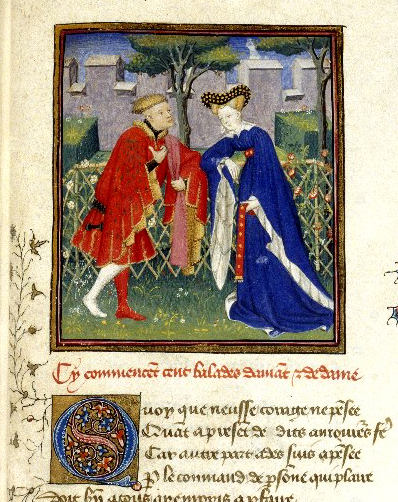
I have completed an annotated translation of the Cent Ballades d’Amant et de Dame, a narrative sequence of one hundred dramatic ballades completed in 1409–1410 by the Italian-French woman poet-philosopher Christine de Pizan. I initially drafted this translation for my doctoral dissertation, but since then it has undergone extensive revisions.
I am currently translating Christine de Pizan’s first collection of Cent Ballades (1394–1399, revised by 1410). I have also translated the Ditié de Jehanne d’Arc (1429), the last poem Christine de Pizan ever wrote and the first poem about Joan of Arc to be written by a woman author.
*In July 2019, as part of the 10th International Christine de Pizan Colloquium at the Sorbonne III, I was honored to witness a live performance by Jeanne Balibar of excerpts from the Cent Ballades d’Amant et de Dame. This event was stunning both because of Madame Balibar’s virtuosity in embodying three disparate personalities (those of Author, Lover, and Lady), and because she chose to read from not one but three languages: Modern English (from my translation); Modern French (in the magnificent tour de force by Jacqueline Cerquiglini-Toulet); and Middle French (from the original text by Christine de Pizan). I cannot thank Madame Balibar enough—impossible d’assez vous remercier pour avoir réalisé ma traduction—for having made my translation a reality.*
Other Translations from Medieval to Modern
“What I cannot recover,” translated from the Portuguese lyric by Filipa de Almada, “O que recobrar não posso,” in Volume 2, no. 3 (August 15, 2022).
“Death,” translated from “Li ver de le Mort” of Adam de la Halle, in Ancient Exchanges 3 (November 19, 2021).
“I loved a sparrowhawk,” translated from an anonymous early Italian sonnet formerly attributed to La Nina Siciliana, in Volume 1, no. 3 (December 15, 2020), together with a reflection on translating this poem.
Ballade 1 from Christine de Pizan‘s One Hundred Ballades (Cent Ballades, ca. 1394–1399), in the Medieval Times Primary Sources Kit (2nd edition) by Teacher Created Materials.
“A French Minstrel and Italian Lady,” adapted from a macaronic Old Occitan / Genovese Italian poem (Domna, tant vos ai prejada) by Raimbaut de Vaqueiras, in Doublespeak (Spring 2020).
Old English Riddle 47, adapted into “Middle French” and translated into Modern English, in Doublespeak (Spring 2018).
“Mice,” adapted from Eustache Deschamps, in New Verse News (July 25, 2017).
“The Government,” adapted from a Middle French ballade by Christine de Pizan, in New Verse News (February 4, 2017).
“Telling the Truth,” also adapted from Christine de Pizan, in Mezzo Cammin 11, no. 2 (January 2017). (Scroll down past the poems to the bottom of the page.)
In Doublespeak (Fall 2016), three translations from the Italian sonnets attributed to La Compiuta Donzella, and one translation of an excerpt from the Middle French Testament of François Villon.
Two translations from the Castilian poetry of Florencia Pinar, in The Berkeley Poetry Review 46 (June 2016). (Click the second link to purchase a copy of the issue in print, or the third link to read the whole issue online.) Quoted by Freya Rohn at the Ariadne Archive (February, 22, 2021).
“A New Language,” adapted from the Middle French of Eustache Deschamps (“Toudis vient un nouvel langaige”), in Matter Monthly 15 (February 2016). Reposted with a reading by Matthew Baker at Poets Corner (December 9, 2021).
“Among the Trobairitz,” a translation from the sole surviving Old Occitan lyric by Bieiris de Romans, in Lunch Ticket 6 as a finalist for the Gabo Prize. Cited by Zoe Franznick on The Maniculum, episode 23: “Pride and Medieval Sexuality” (November 2021).
“Against the Troubadours,” a translation from the Catalan of Ausiàs March (“Leixant a part l’estil des trobadors”), in Lunch Ticket‘s bi-monthly offering, Amuse-Bouche.